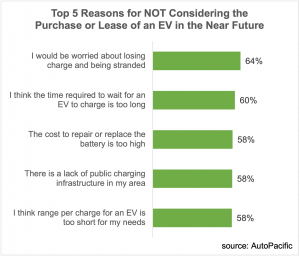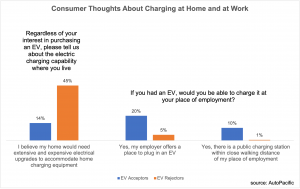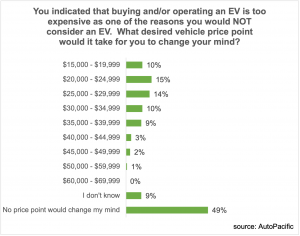Range and Charging Time Top Reasons Consumers Are Saying “No” to EVs
According to a recent AutoPacific survey, range and charge time issues are mostly to blame for deterring potential future electrified vehicle (EV) buyers.
Misperceptions and/or Lack of Charging at or Near Work Deter Potential Buyers
Of respondents who will not consider an EV, 45% believe their home would require extensive and expensive upgrades in order to successfully charge an EV, compared to only 14% of EV acceptors. Additionally, only 6% of rejectors say either their employer offers a place to plug in or a public charging station is within close walking distance, compared to 30% of EV acceptors. “At this point, consumers who can adopt an EV lifestyle most easily are the ones who are going to become EV owners,” says Kim. “While there is a certain level of misunderstanding about at-home chargers, and there’s certainly a lack of public charging infrastructure, it will take a combination of education and availability to grow the EV acceptor population,” continues Kim.
Electrified Vehicles Priced Under $35,000 Could Persuade Some Initial Rejectors
EV cost is also a deterrent, as 41% of respondents cited “buying and/or operating an EV is too expensive” as a reason for rejection. However, a combined 35% of those respondents say they would change their mind if an EV was priced below $35,000. Kim says, “Given the more affordably priced EV entries on the horizon, it’s nice to know there’s not only an existing market for a cheaper EV among EV acceptors, but that a lower price point could sway some initial rejectors to enter the market.”
This finding highlights the importance of getting more affordable EVs into the marketplace as they will be crucially important in achieving federal and state level goals for mass EV adoption. If mainstream middle-class consumers can’t afford them, EVs cannot become truly mainstream vehicles.
About AutoPacific
AutoPacific is a future-oriented automotive marketing research and product consulting firm providing clients with industry intelligence, sales forecasting. The firm, founded in 1986, also conducts extensive proprietary and syndicated research and consulting for auto manufacturers, distributors, marketers, and suppliers worldwide, including its highly recognized Future Attribute Demand Study (FADS). The company is headquartered in Long Beach, California with affiliate offices in Michigan, Wisconsin, and the Carolinas. Additional information can be found at http://www.autopacific.com.
Deborah Grieb
AutoPacific, Inc.
+1 248-219-0234
email us here
Visit us on social media:
Facebook
Twitter
LinkedIn
Legal Disclaimer:
EIN Presswire provides this news content "as is" without warranty of any kind. We do not accept any responsibility or liability for the accuracy, content, images, videos, licenses, completeness, legality, or reliability of the information contained in this article. If you have any complaints or copyright issues related to this article, kindly contact the author above.



